- Home
- Lynne Reid Banks
Two Is Lonely Page 8
Two Is Lonely Read online
Page 8
‘No, I don’t mean that! I’m the one who’s got to marry him.’
But he didn’t hear.
‘I choose Daddy! I choose Daddy!’ he shouted, jumping up and waving the picture about. Then I suppose he saw my face, because he stopped and said, ‘Or if you really don’t like him, couldn’t I choose John?’
I grabbed the bull by the horns. ‘What about Uncle Andy?’
We looked at each other. He’d calmed right down and looked suddenly sober and solemn and quite grown up. He silently laid the photo face-down on the table and came and sat beside me on the floor.
‘I don’t know,’ he said.
‘Do you like him?’
‘Yes . . .’
‘But?’
‘He’s rather old.’
‘Not really, David. He’s only forty-four.’
‘I think that’s bloody old.’
‘David! Anyway, it isn’t.’
‘How old is—’ He indicated the photo.
‘About my age, I think.’
‘Much younger than Uncle Andy.’
‘David, stop thinking about that. I might as well tell you, your father’s married to someone else.’
To my utter consternation and horror, he burst into tears, pulled away from me and ran up to his room. I followed him, and found him on his bed, crying bitterly.
‘Darling, do stop—I’m sorry, I shouldn’t have told you that—’
‘Bloody bugger! I hate him now!’
Shocked, I gathered him against me. ‘Dearest, you mustn’t! You’re not old enough yet to understand. No David, listen. He’s not at all what you think. Why shouldn’t he marry? We decided not to marry each other because of not loving each other enough, so then he had to try to find somebody he did love enough, just like I’m doing—like everyone’s doing, David. Men and women shouldn’t live alone. I wouldn’t have wanted him to—please don’t cry, my sweetheart, please don’t!’
Slowly he stopped. Boy-like, he pulled out of my arms as soon as he felt a little better, and lay on his front, fiddling with the counterpane and occasionally catching his breath in an after-sob. I sat there staring at him. Some strong unpleasant feeling was growing up in me, familiar and yet strange. It was the kraken of guilt, and its familiar aspect was tied to its stirrings every time David screamed for me in the night, every time the psychiatrist’s piquant expression turned my facile replies to her questions inward and gave me a sharp stabbing glimpse of the monster. The strangeness was this sudden new manifestation of David’s lack. His night-wakings were due to a subconscious yearning; but this—this rational conversation, this overt wrestling with his situation, these wild furious tears, all showed that he couldn’t hide it from himself much longer. And when he awoke fully to the implications of his situation, how then would he regard me? How would I be able to regard myself? Sitting there on the bed with my hand resting lightly on David’s still-trembling back, I felt fear running right down to the end of my spine in a tingling wave, like the shock before pain.
Astride the wet pony two weeks later I suffered the same sensation again, remembering it. I had never known what real shame meant, in connection with David, except once, when I found out that Toby was going to marry someone else. For though Toby wasn’t his father, I’d always mentally filled the gap with him. That was when I realised for the first time what it means, in terms of guilt, to have brought a fatherless child into the world. It wasn’t the fact of illegitimacy, it was fatherlessness. But one can’t live with guilt. The feeling faded as I struggled to my feet again emotionally, determined, in what now seemed to me a blindness of arrogance and selfishness, to manage on my own.
I had really contrived to convince myself that if I ‘managed’ to bring David up, that’s to say, if I managed financially, if I managed to give him enough love, to lead a reasonably ‘moral’ life and in all ways do my best for him, that that would be enough; that I would have earned the right to pat myself on the back and tell myself I’d succeeded. Success in such a loaded enterprise is bound to be entirely relative. But now I felt that even if I provided David with a ‘daddy’ the next day, it would still be too late to remedy the wrong I had already done him. Did that wrong not begin even earlier than eight years ago?
My mind went back to a day when I sat in the office of a Harley Street gynaecologist, long before the days of the Abortion Act, and heard him ask me for a hundred guineas to rid me of the trifling inconvenience who was now a person in his own right frightening me out of my wits. I remember his bland mouth saying, ‘What about the young man—the happy father? Doesn’t want to know, I suppose?’ Didn’t want to know? Who could say? Didn’t get told, anyhow. I had been too proud. All right, forgive yourself that, David wasn’t real to you then. Another memory: James, my ex-employer, coming to see me in the L-shaped room: ‘Why don’t you let him know, Jane? Write to him. Tell him. You ought at least to give him a chance . . .’ And my answer, the touchstone of the whole thing: ‘Nobody ever thinks what it would be like for me to go to him wailing: “I’m in trouble! I’m going to have a baby!”’ And I never thought what it would be like for the baby.
I must marry. As Bee plodded slowly home, this was the thought uppermost in my mind. But there were many just impediments. The fiery river of feeling that rushed through me each time I re-read Toby’s letter was an impediment of daunting proportions. And there were others. The word-bridge had been slung across the abyss between Andy and me, but we had yet to test it with the full weight of confidence.
Chapter 5
ANDY came down on that Friday and took me out to dinner.
I knew it was going to be an important occasion, and I felt extraordinarily jumpy as I dressed; when the bell rang a sudden uneasiness close to nausea took hold of me. As soon as I opened the door I was unbalanced still further by the fact that he was wearing a dinner-jacket, which I had never seen him in before. It dismayed me somehow, because I particularly needed to feel at ease with him that evening and in formal wear he had a towny aloofness.
To make matters worse he had brought me, of all things, an orchid, complete with ribbon and cellophane box. I thanked him, warmly and hypocritically, but was relieved when he laughed aloud and said, ‘I can see you hate it. Here, give it back.’ He stuck it into a little vase on the mantelpiece.
‘There. Let it wither as a reminder that you are not to be wooed as other women are wooed. I shall not repeat my mistake.’ He took my hands and said something nice about my dress.
‘It’s all wrong to go with your splendour.’
‘Was that a mistake too? Funny how I always overdo my symbolics. When we’ve had dinner I shall come back here and remove my jacket—oh hell, no, I can’t. Even I can’t make love in braces.’
‘Those could come off too.’
He stared at me, his face so full of different expressions it looked blank.
‘That might carry my love-making a little forrader than I’d anticipated tonight,’ he said seriously. ‘However, let’s not plan too far ahead. We have a bridge to cross before we reach the point of removing our braces, I think.’
Georgie arrived at that moment to baby-sit (I was safe in going out and leaving David provided I was home by about midnight—nothing ever happened before then). She looked very pretty in her frayed jeans, love-beads and squaw’s headband. She greeted us and went straight upstairs to David, only pausing to ask when I wanted him in bed.
‘Eight sharp, and no stay of execution. Remind him about the gymkhana the day after tomorrow, for which he needs to rest up.’
‘Oh, that won’t work. Even I’m not old enough to look more than one day ahead.’
She disappeared round the spinning-wheel. When I turned back to Andy, I was surprised to see a look of interest bordering on calculation on his face.
‘How old?’ he asked.
‘Seventeen,’ I said. ‘WHY?’
He laughed. ‘Oh, come off it! Either I’m past that stage, or I haven’t reached it yet. No, it’s for my s
on I always feel speculative when I see something pretty and promising of that generation.’
Had he dropped this pebble deliberately, as I was sure he had done before, to watch the ripples of curiosity break frustratingly against my sides? But this time I let myself ask.
‘Tell me about him.’
‘Yes, I’m going to. I’ve been gearing myself all day. Only after dinner.’
‘At.’
‘After.’
But it turned out to be ‘at’ after all, because he took me to a place where the food was so good that as soon as we began on the paté maison and found it really was maison and not tinned, I knew I’d have to take firm action to stop it developing into a Tom Jones kind of meal in which every shared bite is a sensual exchange. So I said again, ‘Come on, now. Chris.’
He dropped his eyes from my face and attended desultorily to his paté for a few moments in silence, and then he sighed heavily and said, ‘With your natural acuity I suppose you’ve already gleaned that we’re not entirely satisfied with each other.’
‘Well, yes. What’s the trouble?’
‘That can’t be told in a word. Well, or perhaps it can—at the moment the word is pot. Or is it hash? I never know the difference. But that wouldn’t matter so much. Before that it was filial contempt, which is older, and underlying it all is something even older than that, which I believe was ancient when the devil adopted it as one of his cardinal vices.’
‘Which one?’ I asked, intrigued.
‘Sloth.’
‘You mean he’s a drop-out?’
‘It’s such a long time since he was in . . . Let’s see. At fifteen he was still in, a very good school and doing admirably. But by the time he was sixteen he’d been expelled for pot-smoking. He was the first boy it ever happened to there—not the last, of course, but the first: a distinction which he chooses to regard as an honour. Since then he has done nothing. I mean of course, nothing that anyone of my generation would count as constructive labour. The very notion of work fairly bowls him over with mirth.’
‘How does he live? Do you keep him?’
‘I did, for a while. But after he turned 18, I turned nasty. Since he evidently regarded me as a senile old idiot, in so far as he looked upon me as a human being at all, I failed to see why I should go on giving him money. I was also, at that time, a prey to the naïve idea that since in my day you had to have money to live on, it must still be so, and that if I stopped giving him any he’d have to come back into the world of reality in order to eat.’
‘Was that naïve?’
‘Oh yes. Because first of all, to these kids food is of minor importance. You can buy a five-pound bag of lentils in the Portobello Road for virtually nothing, and porridge oats, also by the sack; soupbones are often free, and if you grovel round the markets after the stalls have packed up you can scavenge all sorts of semi-edible produce sufficient to maintain your scraggy, underfleshed carcass. And if food doesn’t matter much, clothes and a decent place to live don’t matter a damn, of course. My son, or rather his scruffy remains, currently shares a pad, which is a flat in an all-but-derelict house, with a varying number of young males and females, virtually indistinguishable from each other. I’ve seen it. Once. I’d really rather not describe it to you. I believe there are worse places; I mean their lavatory does work and they use it, but apart from that it’s hard to imagine anything much more squalid. In those chaotic rooms, or in the park, or in the streets, or at night in an assortment of cafés and coffee bars, they hang around together, smoke, talk gibberish, and copulate in various bizarre combinations. This last they dare to call ‘making love’, but I don’t allow Chris to use that expression in front of me. I now feel that I, as a representative of a dying generation which did and do make love, have a sort of sacred duty to guard even our terminology from corruption. They do their own things; let them call them by their own names.’
I noticed he had stopped eating, and a very stiff look about him gave me the impression he would be trembling if he were not holding himself rigid.
‘Let’s talk about it later,’ I suggested, somehow alarmed into cowardice.
He ignored this, sighed again, and went on: ‘Of course I’ve tried to discuss the whole mysterious business with him. We can’t really reach each other. I don’t think anyone of my age can reach anyone of his, and in any case, as you know, I’m not much good at words.’
‘But you’re good at feelings. How do you feel about him?’
He looked at me sadly. ‘I love him, but I detest him. I can’t bear the way he looks, his long shaggy hair, his ragged “gear”, his unshaven face which once shone with intelligence and which now merely beams with a sort of self-conscious, vacuous, all-embracing benignity. Oh yes, it even embraces me, and it maddens me, because in actual fact he despises me and everything I represent.’
‘Yet there’s a room in your new house for him.’
‘Which is not to say I shall be sorry if he never uses it.’
‘Do you expect him to?’
He shrugged. ‘Who knows? I haven’t set eyes on him for three months.’
Staggered, I asked: ‘Then how do you know he’s all right?’
After a longish pause, during which he abandoned his efforts to eat and lit a cigarette, he said, ‘I have a spy. The house where he lives—to lend him a piece of my terminology—has one flat left in it which is still inhabited by a real person, a woman called Mrs. Wax. I don’t know how she can stand it there, but she’s right up on the top floor with two intervening doors which can lock. I went up to see her once, and in a remarkably short conversation—she’s not clever but she understood my situation extraordinarily well—we arranged that she should telephone me once a week to let me know that she’d seen him and that he was all right. I offered her a fee for this service, but she refused it. Her own son, it seems, has burst from the pubertal chrysalis as a Skin-head.’
‘But I still don’t understand. How do they manage for money?’
‘They con it, which is to say they beg it off anybody who’ll give it to them, using their wits or whatever means, fair or foul, come to hand.’
‘Foul? You mean stealing?’
‘God, I hope not! By foul, I really meant degrading.’ After a moment or two he went on: ‘And they busk. The latest thing is playing a guitar in the underground. It so happens that Chris plays pretty well, and frankly I wouldn’t mind that so much. It’s better than conning—at least he’s doing something to earn the coins that are tossed at him. But he only resorts to that when easier methods have failed. He has a philosophy, so-called, which he kindly explained to me once. Do you remember the flower-children?’
‘They’re still going on, aren’t they?’
‘Are they? Well, with him it’s water.’
‘Water?’
‘Yes. It has a weird rationale of its own, the whole thing. Let me see now, if I’ve got it right. Water is the most vital substance in the world. Our bodies are 80 per cent or something water. Without water nothing will grow. With water things grow even without earth. Water can keep us alive, or kill us. Water is great, clean, pure, natural. Water is the force of life. Water is omnipotent. Water is God.’ He shifted his position and took another deep breath to keep his voice calm. ‘Well now. So, says my son, let’s look at water and see how it behaves. Let us, if you can credit it, emulate water. Water toils not, neither doth it spin, but Old Man River, he just keeps rollin’ along. Without effort or force of its own, just by its own weight and the pull of gravity it provides motive-power for humanity. And it always take the easy way. It resists all efforts to force it to flow uphill or to do anything except take the line of least resistance.’
‘Go on—it’s clever.’
‘Oh, he’s not stupid. He’s worked out all this phoney nonsense, and he’s started a kind of cult of his own, of which he’s the unchallenged leader, with the help of the good brain he inherited from me.’
‘What does the cult practise?’
; ‘Getting wet, chiefly. Not washing, you understand. Just dipping.’
‘How?’
‘Once a day they all jump into the Serpentine—kind of ritual baths. Clothes and all, of course, which upsets the police, but when there’s a guard on the Serpentine they go off to Trafalgar Square and jump in the fountains, or wade into the Round Pond or the pond on Hampstead Heath, or, at a pinch, into the river, though they object to that because the Establishment has polluted it.’
‘Has he ever been to jail?’
‘Oh, my dear Jane! Lots of times. A night here, a night there. The police all know him and his gang. They never resist arrest, they’re never abusive. Just dripping wet. They drip all over the floors of the police-stations. Because of that they often don’t bother to arrest them, they just chase them out of whatever body of water they happen to be in and threaten them with mayhem if they ever catch them again.’
The mental picture made it hard for me not to smile.
‘Go on,’ said Andy with sudden bitterness. ‘Have a good laugh. You wait till David’s old enough to become a neo-Troglodyte or something.’
‘I must say, though,’ I said, ‘that jumping into cold lakes every day and being lugged off to jail and all that, hardly seems consistent with taking the line of least resistance in life. It takes not only a lot of energy and determination, but hardiness as well.’
‘They claim that water attracts them and that it would take greater energy to keep away from it.’ He looked at the ceiling for a moment and then leant suddenly across the table at me. ‘Jane, what do you think of it all? How would you cope with it? He’s nearly nineteen, for Christ’s sake!’
‘Well, I don’t know if it’s as awful as you seem to think. I’ve heard of much crazier things. It sounds to me just like another youth-cult, rather more harmless and better-thought-out than most. Everything depends on what kind of person he really is, under the fad, which must surely be a phase. I mean, is he really bone idle as you suggest, and simply rationalising it and having a bit of fun at the same time, or is he a genuine rebel against society?’

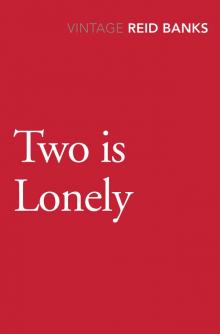 Two Is Lonely
Two Is Lonely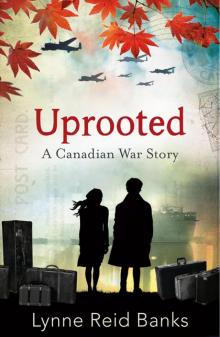 Uprooted - a Canadian War Story
Uprooted - a Canadian War Story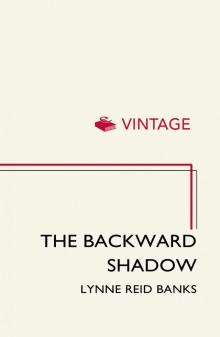 The Backward Shadow
The Backward Shadow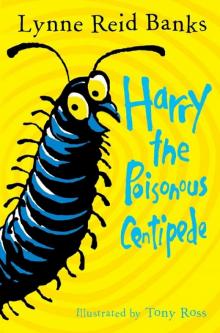 Harry the Poisonous Centipede: A Story to Make You Squirm
Harry the Poisonous Centipede: A Story to Make You Squirm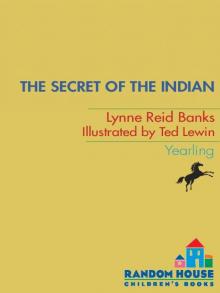 The Secret of the Indian (The Indian in the Cupboard)
The Secret of the Indian (The Indian in the Cupboard)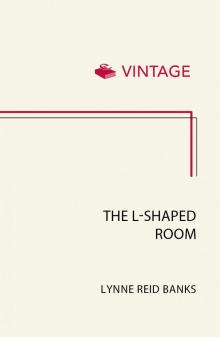 The L-Shaped Room
The L-Shaped Room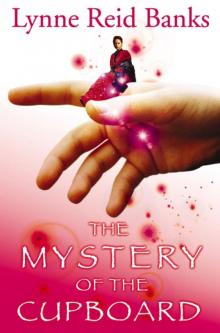 The Mystery of the Cupboard
The Mystery of the Cupboard The Farthest-Away Mountain
The Farthest-Away Mountain Harry the Poisonous Centipede Goes to Sea
Harry the Poisonous Centipede Goes to Sea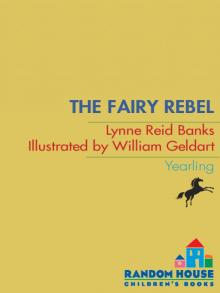 The Fairy Rebel
The Fairy Rebel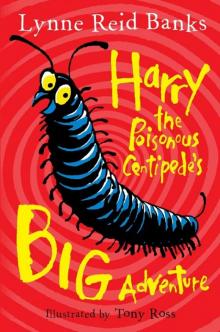 Harry the Poisonous Centipede's Big Adventure: Another Story to Make You Squirm
Harry the Poisonous Centipede's Big Adventure: Another Story to Make You Squirm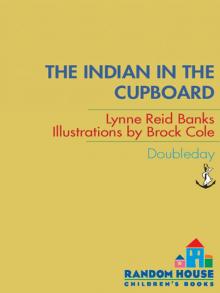 The Indian in the Cupboard
The Indian in the Cupboard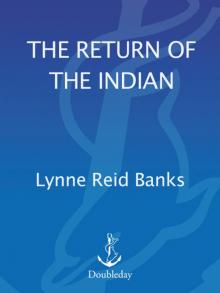 The Return of the Indian
The Return of the Indian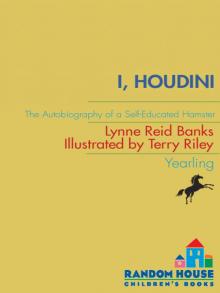 I, Houdini
I, Houdini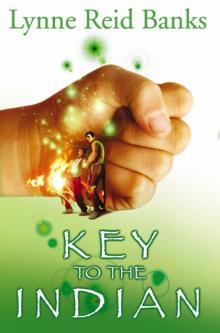 The Key to the Indian
The Key to the Indian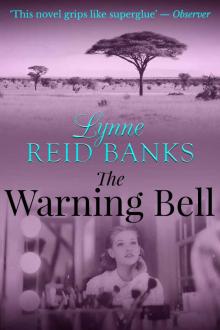 The Warning Bell
The Warning Bell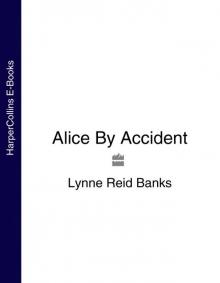 Alice by Accident
Alice by Accident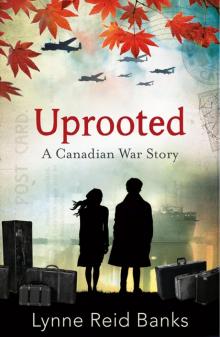 Uprooted
Uprooted Writing On the Wall
Writing On the Wall The Adventures of King Midas (Red Storybook)
The Adventures of King Midas (Red Storybook)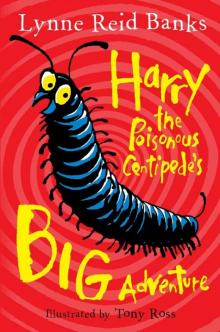 Harry the Poisonous Centipede's Big Adventure
Harry the Poisonous Centipede's Big Adventure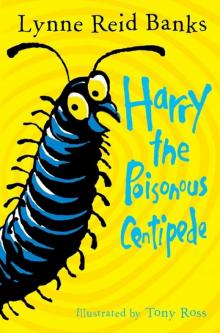 Harry the Poisonous Centipede
Harry the Poisonous Centipede The Dungeon
The Dungeon Bad Cat, Good Cat
Bad Cat, Good Cat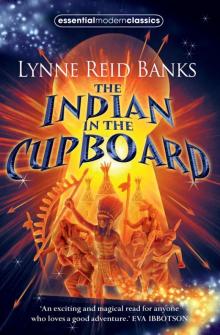 The Indian in the Cupboard (Essential Modern Classics, Book 1)
The Indian in the Cupboard (Essential Modern Classics, Book 1) Tiger, Tiger
Tiger, Tiger